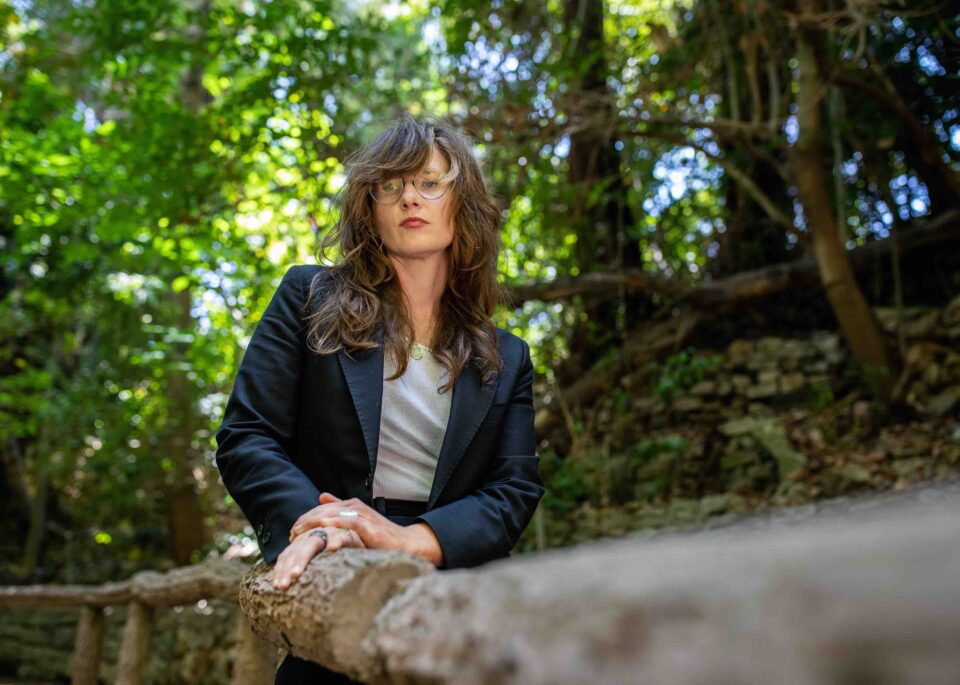S.G. Goodman is a hoarder of missed connections. She can’t let them go, so no voicemail from friend or loved one is ever simply heard and deleted. They pile up on the songwriter’s phone like precious markers of sound and memory, and became an essential source of comfort after the recent suicide of a good friend, whose amiable voice in a message from 2017 lives on right where Goodman left it. On her new album, Teeth Marks, Goodman explores that idea on the quiet ballad “Patron Saint of the Dollar Store,” singing of life and loss in a gentle warble: “Now I’m back to my answering machine / You know it’s all filled up / Where I’ve been a harvester of sound / From the people I love.”
In much the same way, as her grandfather was dying in the hospital five years ago, she recorded her final conversations with him, preserving his words and presence. “Now my mom can hear her dad’s voice. I’m a secret Alan Lomax of my loved ones,” she says, comparing herself with a laugh to the great musicologist whose field recordings eight decades ago revealed American folk and blues to the world. Her harvesting of voices continues. “I’m friends with a lot of people who are much older than I am, you know?” says Goodman, 33, of her need to preserve more and more voices before they too are gone. “I know what I’m doing. One day I will have more, unfortunately.”
Her own journey is just getting started. Goodman’s debut album, 2020’s Old Time Feeling, landed to critical acclaim and the beginnings of a national audience ready for her songs of tenderness and bite. With her just-released second album, Teeth Marks, the songs go even deeper into character and the complexity of life as she’s known it in rural Kentucky. The album’s 11 songs reveal her main gifts: lyrics with meaning and literary flair, sung in a voice of timeless power and hurt as fit for the subtleties of folk music as the noisiest indie rock. Her background growing up on a farm in the 3,000-population hamlet of Hickman on the Mississippi River has meant being declared a musical ambassador for life in the rural South, voluntary or not. But she’s also gay and politically progressive in a region that’s traditionally conservative, inevitably making her a symbol for queer inclusion to many listeners who may feel isolated and alone.
“I fully believe that a song is gonna go about its business. It’s gonna tell you what it wants to be. So I don’t always think about an album as a whole or what kind of messages I want to have in it.”
“I don’t write concept albums,” she says. “I definitely don’t have a clear agenda when it comes to writing. I fully believe that a song is gonna go about its business. It’s gonna tell you what it wants to be. So I don’t always think about an album as a whole or what kind of messages I want to have in it. I’m just living my life and writing songs when they appear. And that’s about as far as I think about it.”
Goodman had first planned to take her songs around the world with the release of Old Time Feeling, but because of COVID-19, she spent most of 2020 and 2021 at home, unable to tour or to generally take full advantage of the positive reaction to her music. She was like a spectator of her own career, doing what little she could from Kentucky, with some live-streaming—a real challenge from a town lacking a strong and consistent internet signal. “In one afternoon I had over 50 dates canceled,” Goodman remembers. “For the most part, the day my record came out, I celebrated in my living room and watched it happen on my phone.”

Singer-guitarist S.G. Goodman, who was about to release her second album, “Teeth Marks.” The acclaimed Kentucky-based artist was passing through Los Angeles to perform a concert.
This year, she’s finally getting her chance to connect in person with her audience. Her US tour starts in July, first opening for John Moreland, followed by headline dates of her own in the East. During that first year of the coronavirus, she did get out to the historic Fame Studios in Muscle Shoals, Alabama, to record a cover of Townes Van Zandt’s “Lungs.” This was pre-vaccine, making the trip a delicate operation, masked up in the studio, avoiding contact, peeing en route on the side of the road rather than in public bathrooms. By January 2021, she’d had enough waiting and told her manager she needed to record another LP. Goodman pushed herself to write an album’s worth of material. “I’m not a factory when it comes to writing,” she says. “I don’t have, like, a hundred songs sitting in a notebook at home ready to come to life.”
“I’d probably get bored with a heavy record all the way through. I want ebbs and flows because I think that’s more representative of human experience.”
Teeth Marks was recorded in Athens, Georgia, with some songs written before COVID, some during. On the new album cover, the singer is depicted in a connect-the-dots drawing, the connecting lines waiting to be added. The title song opens the record with a gently cascading acoustic guitar, and a voice strong and vulnerable, hopeful and hurt: “When you left the bed after you bit my arm / A little souvenir where your teeth left marks.” It’s a song on unrequited love, she says, imagining a shared commitment that doesn’t actually exist, “like a phantom limb.” It’s the kind of love and longing that leaves a wound. “If you have teeth marks on you, somebody’s responsible—or something is,” she says. “We’re all walking around with them, so that’s the reality of it.”
There’s a wide range of sounds on the album, from stripped-down a cappella (“You Were Someone I Loved”) to the noisier, rockier stuff (the snarling “Work Until I Die,” or the swirling Velvet Underground–ish wind-out that closes “All My Love Is Coming Back to Me”). “I like different types of songs,” she says. “I’d probably get bored with a heavy record all the way through. I want ebbs and flows because I think that’s more representative of human experience.”

Singer-guitarist S.G. Goodman, who was about to release her second album, “Teeth Marks.” The acclaimed Kentucky-based artist was passing through Los Angeles to perform a concert.

Singer-guitarist S.G. Goodman, who was about to release her second album, “Teeth Marks.” The acclaimed Kentucky-based artist was passing through Los Angeles to perform a concert.
Two years ago, she opened her debut with “Space and Time,” a song written when she was struggling with how some around her reacted to her sexuality. Performed like a classic country torch song with twangy, dreamy guitar, Goodman sang: “I owe my life to even my enemies / The ones who have loved me, the ones who have tried / Their grips on my heart and their grips on my mind.” When the 2020 debut was released, Billboard described her in print as “a queer farmer’s daughter,” which caught her and some of her extended family and associates by surprise. She began fielding questions about her sexuality not only in interviews, but closer to home. Goodman was suddenly part of a public discussion she hadn’t prepared for.
“After seeing the response, and understanding what representation has meant for so many people who have reached out to me, I do see the purpose in me talking about my sexuality.”
“I didn’t grow up with the queer community,” she explains. “I still don’t have a large group of queer friends, and there’s a reason for that—because I live in a very small, isolated place.” Out in rural Kentucky, growing up on a farm, and then living in a small college town, she didn’t have the same options for connections with a larger gay populace as she would in Louisville or Manhattan. “It’s not because I’m not going out and trying to have a community. It’s just that for some people, the reality is they grow up without one.” Culturally, Goodman also comes from a place where intimacy is usually a very private subject. “I’m a recovering Southern Baptist, so I’m probably modest in every way,” she adds. “It’s just the way I was raised.”
But she also heard from listeners drawn to her songs and her as a symbol of possibility. So with Teeth Marks, she’s come to see a role her music can play in bringing a sense of community, comfort, and belonging to others in need. “After seeing the response, and understanding what representation has meant for so many people who have reached out to me,” she explains, “I do see the purpose in me talking about my sexuality.”
As if to answer her earlier self, Goodman closes Teeth Marks with a song easily interpreted as a sequel to the despairing “Space and Time.” “Keeper of the Time” begins gently as Goodman sings, “It’s not something you should carry / Then you better set it loose.” It slowly builds in layers of sound and emotion, vocals a soaring quiver, leading to a crescendo of noisy guitars and bashing drum beats. “That song in particular was truly all about catching a feeling,” Goodman says of a session that sought to reflect the emotion of the lyrics, which were fueled by “my experience with being gay in a small place where people in their context believe certain things about gay people.
“Being a progressive in the South, I believe in letting the world know that we exist. There’s power in numbers, and I’m always proud to be able to take part in things I believe in.”
“Unfortunately, when Billboard said I’m a ‘gay farmer’s daughter,’ I had some upset people on my hands with that,” she continues. “And I think through my own processing and therapy and putting stuff into practice, I’ve been able to address the lingering trauma that was still there for me, and probably will always be.” There was anger and sadness with the realization that some people in her life would never see her real accomplishments as anything to celebrate, “because I was doing it while gay,” she says now. “You do the work and process it. It’s a way we leave teeth marks on ourselves.”
Goodman can imagine herself living in other parts of the country, including New York City, and just might try that down the line, but for now she’s chosen to stay close to home. Her current residence is only an hour east of her hometown. She’s participated there in protests against police brutality and the Robert E. Lee statue that still stands by the county courthouse. “Being a progressive in the South, I believe in letting the world know that we exist,” she says. “There’s power in numbers, and I’m always proud to be able to take part in things I believe in.”

Singer-guitarist S.G. Goodman, who was about to release her second album, “Teeth Marks.” The acclaimed Kentucky-based artist was passing through Los Angeles to perform a concert.
She also has pride for the rural way of life that raised her. She worked on the family farm, and as a teen was involved in shooting-sports competitions—and was good at it. One day, she was out deer hunting alone in the woods as a 14-year-old, armed with her brother’s 20-gauge rifle, when she noticed a bobcat stalking her. Then it charged, and she shot and killed it. The animal is now stuffed and resides on top of a piano in her home, but she regrets it ever happened, blaming her inexperience at the time. “You could probably just make a little noise and it would’ve run away,” she says, then laughs as she imagines herself as an enticing target to a feline predator.
Goodman’s shooting days are now behind her, and her guns are kept back at her parents’ place. “My relationship with guns is complicated,” she says. “I like to say something that a friend of mine says—that I can be too liberal for my country friends and too country for my liberal friends. Clearly, we’ve got major issues. If I was in charge of gun laws, they would be so strict that people would have to come in and prove their accuracy every year.”
She also recognizes that for those far outside rural Appalachia and the South, perceptions of country living are often based on cartoonish stereotypes. She’s not looking to be the “poster child” for the pastoral South, but simply wants to reflect the reality she’s always known. “Rural representation is very popular right now, but it’s not always represented by people who actually are from the country. I definitely take a lot of time and try to be respectful of the characters that appear in my music. I want to do it justice. It’s a complicated place, but it’s really beautiful. And the people there are beautiful. You’ve got to represent all the sides of it.” FL







